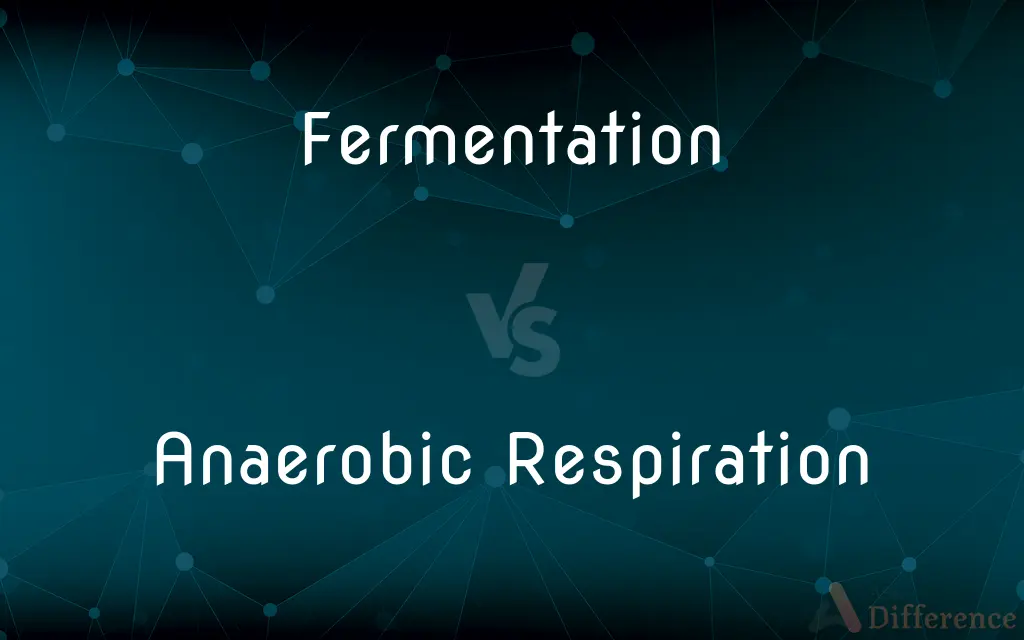Fermentation vs. Anaerobic Respiration — What's the Difference?
By Tayyaba Rehman — Published on October 17, 2023
Fermentation is a metabolic process converting sugar to acids, gases, or alcohol; Anaerobic Respiration is cellular respiration without oxygen, producing ATP. Both yield energy without using oxygen.

Difference Between Fermentation and Anaerobic Respiration
Table of Contents
ADVERTISEMENT
Key Differences
Fermentation is a fascinating metabolic process, deriving energy from sugars and converting them into acids, gases, or alcohol. It's a type of anaerobic process, meaning it occurs without the use of oxygen. In contrast, Anaerobic Respiration is a broader term that refers to any cellular respiration that takes place without the presence of oxygen, resulting in the production of adenosine triphosphate (ATP) for cellular energy.
The distinction between Fermentation and Anaerobic Respiration can sometimes be subtle. While both are anaerobic processes, fermentation does not involve the electron transport chain, a characteristic feature of respiration. Anaerobic Respiration, on the other hand, uses electron transport chains but without the final electron acceptor being oxygen.
A well-known example of Fermentation is the production of ethanol by yeast, utilized in making alcoholic beverages. This process involves the conversion of glucose into ethanol and carbon dioxide. Anaerobic Respiration, meanwhile, can be seen in certain bacteria that thrive in oxygen-depleted environments. These bacteria utilize other molecules, like sulfate or nitrate, as the final electron acceptor in their respiratory chain.
To clarify, all Fermentation is anaerobic, but not all anaerobic processes are fermentation. Anaerobic Respiration is more akin to aerobic respiration in its steps, only differing in the absence of oxygen. Fermentation, though also producing energy without oxygen, has a different metabolic pathway.
In real-world implications, understanding Fermentation is crucial for industries like brewing and baking. Meanwhile, knowledge about Anaerobic Respiration is pivotal in fields like environmental science and wastewater treatment, as certain bacteria utilize this process to break down pollutants.
ADVERTISEMENT
Comparison Chart
Definition
Converts sugar to acids, gases, or alcohol
Cellular respiration without oxygen, producing ATP
Involves Electron Transport Chain?
No
Yes, but without oxygen
End Products
Alcohols, gases, or acids
Various (e.g., lactic acid or ethanol) depending on organism
Typical Organisms
Yeast, certain bacteria
Some bacteria, certain muscle cells
Use in Industry
Brewing, baking, dairy
Wastewater treatment, bioremediation
Compare with Definitions
Fermentation
Used widely in food and beverage industries.
The beer-making process heavily relies on fermentation.
Anaerobic Respiration
A form of energy metabolism distinct from fermentation.
Even though both are oxygen-independent, fermentation and anaerobic respiration are distinct processes.
Fermentation
Yields energy and produces acids, gases, or alcohol.
Fermentation is the reason behind the fizziness in kombucha.
Anaerobic Respiration
Cellular respiration in the absence of oxygen.
Some bacteria use anaerobic respiration in oxygen-deprived environments.
Fermentation
Metabolic process converting sugar into energy without oxygen.
Yeast uses fermentation to produce ethanol and carbon dioxide from sugar.
Anaerobic Respiration
Yields different end products based on organisms and conditions.
Some microbes produce methane as a result of anaerobic respiration.
Fermentation
An anaerobic breakdown of organic compounds.
The fermentation of milk produces yogurt with the help of bacteria.
Anaerobic Respiration
Uses electron transport chains without oxygen.
Certain bacteria utilize nitrate instead of oxygen in their anaerobic respiration.
Fermentation
Bypasses electron transport chains in energy production.
In fermentation, pyruvate from glycolysis is directly transformed into end products.
Anaerobic Respiration
Produces ATP without oxygen.
Muscle cells can resort to anaerobic respiration during intense exercise.
Fermentation
Any of a group of chemical reactions induced by microorganisms or enzymes that split complex organic compounds into relatively simple substances, especially the anaerobic conversion of sugar to carbon dioxide and alcohol by yeast.
Fermentation
Unrest; agitation.
Fermentation
(biochemistry) Any of many anaerobic biochemical reactions in which an enzyme (or several enzymes produced by a microorganism) catalyses the conversion of one substance into another; especially the conversion (using yeast) of sugars to alcohol or acetic acid with the evolution of carbon dioxide
Fermentation
A state of agitation or excitement; a ferment.
Fermentation
The process of undergoing an effervescent change, as by the action of yeast;
Fermentation
A state of agitation or excitement, as of the intellect or the feelings.
It puts the soul to fermentation and activity.
A univesal fermentation of human thought and faith.
Fermentation
A process in which an agent causes an organic substance to break down into simpler substances; especially, the anaerobic breakdown of sugar into alcohol
Fermentation
A state of agitation or turbulent change or development;
The political ferment produced a new leadership
Social unrest
Fermentation
A chemical phenomenon in which an organic molecule splits into simpler substances
Common Curiosities
What does Fermentation produce?
Fermentation converts sugars into acids, gases, or alcohol.
Is Anaerobic Respiration the same as Fermentation?
No, while both occur without oxygen, they have distinct metabolic pathways.
Why don't Fermentation processes use the electron transport chain?
Fermentation bypasses this chain, directly converting pyruvate into end products.
Why is Fermentation important in the food industry?
Fermentation is used in making products like beer, yogurt, and sourdough bread.
What is lactic acid fermentation?
It's a type of Fermentation where glucose is converted to lactic acid, commonly seen in muscle cells.
Why does bread rise?
Yeast ferments sugars, producing carbon dioxide gas which makes bread rise.
Is all Anaerobic Respiration a form of Fermentation?
No, while all fermentation is anaerobic, not all anaerobic processes are fermentation.
How does Anaerobic Respiration benefit some bacteria?
It allows them to produce energy in environments lacking oxygen.
Do humans undergo Anaerobic Respiration?
Yes, muscle cells can use anaerobic respiration during intense, short bursts of activity.
Is oxygen ever involved in Anaerobic Respiration?
No, by definition, anaerobic respiration occurs without oxygen.
Can Anaerobic Respiration produce ethanol?
Yes, certain organisms can produce ethanol as an end product of anaerobic respiration.
What organisms typically undergo Fermentation?
Organisms like yeast and certain bacteria typically perform fermentation.
Are there beneficial uses for Anaerobic Respiration in the environment?
Yes, certain bacteria use it to break down pollutants in wastewater treatment.
What's the role of pyruvate in Fermentation?
Pyruvate, produced from glycolysis, gets transformed into end products in fermentation.
Can Fermentation occur in aerobic conditions?
While fermentation is an anaerobic process, it can occur in aerobic conditions if oxygen is not used for energy production.
Share Your Discovery

Previous Comparison
Fidelity vs. Integrity
Next Comparison
Boolean vs. BinaryAuthor Spotlight
Written by
Tayyaba RehmanTayyaba Rehman is a distinguished writer, currently serving as a primary contributor to askdifference.com. As a researcher in semantics and etymology, Tayyaba's passion for the complexity of languages and their distinctions has found a perfect home on the platform. Tayyaba delves into the intricacies of language, distinguishing between commonly confused words and phrases, thereby providing clarity for readers worldwide.












































